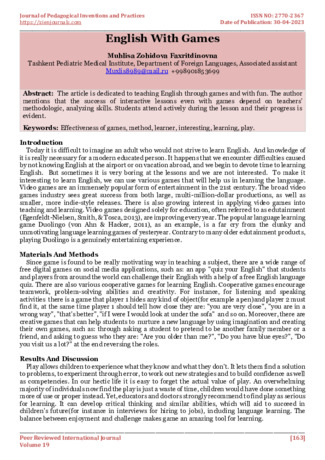
Journal of Pedagogical Inventions and Practices ISSN NO: 2770-2367
Date of Publication: 30-04-2023
______________________________________________________________________________________________________________________________________
________________________________________________________________________________________________________________________________
Peer Reviewed International Journal [163]
Volume 19
English With Games
Muhlisa Zohidova Faxritdinovna
Tashkent Pediatric Medical Institute, Department of Foreign Languages, Associated assistant
Abstract:
The article is dedicated to teaching English through games and with fun. The author
mentions that the success of interactive lessons even with games depend on teachers'
methodologic, analyzing skills. Students attend actively during the lesson and their progress is
evident.
Keywords:
Effectiveness of games, method, learner, interesting, learning, play.
Introduction
Today it is difficult to imagine an adult who would not strive to learn English. And knowledge of
it is really necessary for a modern educated person. It happens that we encounter difficulties caused
by not knowing English at the airport or on vacation abroad, and we begin to devote time to learning
English. But sometimes it is very boring at the lessons and we are not interested. To make it
interesting to learn English, we can use various games that will help us in learning the language.
Video games are an immensely popular form of entertainment in the 21st century. The broad video
games industry sees great success from both large, multi-million-dollar productions, as well as
smaller, more indie-style releases. There is also growing interest in applying video games into
teaching and learning. Video games designed solely for education, often referred to as edutainment
(Egenfeldt-Nielsen, Smith, & Tosca, 2013), are improving every year. The popular language learning
game Duolingo (von Ahn & Hacker, 2011), as an example, is a far cry from the clunky and
unmotivating language learning games of yesteryear. Contrary to many older edutainment products,
playing Duolingo is a genuinely entertaining experience.
Materials And
Methods
Since game is found to be really motivating way in teaching a subject, there are a wide range of
free digital games on social media applications, such as: an app "quiz your English" that students
and players from around the world can challenge their English with a help of a free English language
quiz. There are also various cooperative games for learning English. Cooperative games encourage
teamwork, problem-solving abilities and creativity. For instance, for listening and speaking
activities there is a game that player 1 hides any kind of object(for example a pen)and player 2 must
find it, at the same time player 1 should tell how close they are: "you are very close", "you are in a
wrong way", "that's better", "if I were I would look at under the sofa" and so on. Moreover, there are
creative games that can help students to nurture a new language by using imagination and creating
their own games, such as: through asking a student to pretend to be another family member or a
friend, and asking to guess who they are: "Are you older than me?", "Do you have blue eyes?", "Do
you visit us a lot?" at the end reversing the roles.
Results And Discussion
Play allows children to experience what they know and what they don't. It lets them find a solution
to problems, to experiment through error, to work out new strategies and to build confidence as well
as competencies. In our hectic life it is easy to forget the actual value of play. An overwhelming
majority of individuals now find the play is just a waste of time, children would have done something
more of use or proper instead. Yet, educators and doctors strongly recommend to find play as serious
for learning. It can develop critical thinking and similar abilities, which will aid to succeed in
children's future(for instance in interviews for hiring to jobs), including language learning. The
balance between enjoyment and challenge makes game an amazing tool for learning.

Journal of Pedagogical Inventions and Practices ISSN NO: 2770-2367
Date of Publication: 30-04-2023
______________________________________________________________________________________________________________________________________
________________________________________________________________________________________________________________________________
Peer Reviewed International Journal [164]
Volume 19
To bear English lessons in a fun way with a help of some kinds of games, while English language
is becoming more and more widespread, yet its lessons are getting monotonous and of no benefit (is
taught in an ordinary way) for students. Games can also be of great use for students who are
considered to be shy and embarrassed about making mistakes, so that it can provide a mammoth
opportunity for those students to communicate not only in a safe, but also in a fun away.
Conclusion
According to the facts and factors it is generally believed that games are considered fantastic and
of great values in acquiring at any age, yet mostly, particularly significant for young learners. A
research by a team at Cambridge English shows that games are appeared to be really essential for
healthy development in early childhood and beyond. In fact, majority of students have shown more
engagement, participation, curiosity, achievement and recall of their learning.
Reference
1.
Simon Egenfeldt-Nielsen, Jonas Heide Smith, Routledge 26 April 2013
2.
Mery Silalahi, Improving Students’ Interest in Learning English by Using Games April 2019
(https://www.researchgate.net/journal/International-Journal-of-Theory-and-Application-
in-Elementary-and-Secondary-School-Education-2656-0003)International
Journal
of
Theory and Application in Elementary and Secondary School Education






